★★
“Basic, and in need of training”
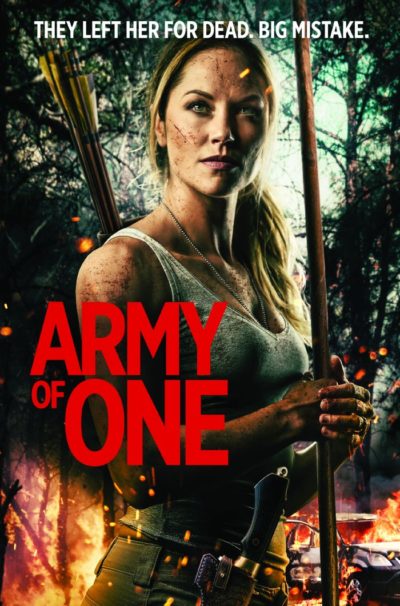 Husband and wife Dillon (Passmore) and Brenna Baker (Hollman) are out on a camping trip in the Alabama wilderness. They have a brush with some crude locals, led by the mountainous Butch (Kasper), but are saved by his diminutive mother (Singer), who takes no crap from anyone, and whom everyone locally calls Mama. Later, while sheltering from the rain in a deserted cabin, the Bakers stumble across a cache of arms. Before they can do anything, they are captured by the owner – Butch, of course, since his family are involved in a whole slew of criminal activities, including white slavery. Any hopes of playing the innocent tourists are wiped out when Butch finds Dillon’s police ID. Oops. He and his gang dispose of the couple, but do a poor job on Brenna. And, it turns out, she’s a former Army Ranger, who now has vengeance on her mind.
Husband and wife Dillon (Passmore) and Brenna Baker (Hollman) are out on a camping trip in the Alabama wilderness. They have a brush with some crude locals, led by the mountainous Butch (Kasper), but are saved by his diminutive mother (Singer), who takes no crap from anyone, and whom everyone locally calls Mama. Later, while sheltering from the rain in a deserted cabin, the Bakers stumble across a cache of arms. Before they can do anything, they are captured by the owner – Butch, of course, since his family are involved in a whole slew of criminal activities, including white slavery. Any hopes of playing the innocent tourists are wiped out when Butch finds Dillon’s police ID. Oops. He and his gang dispose of the couple, but do a poor job on Brenna. And, it turns out, she’s a former Army Ranger, who now has vengeance on her mind.
It’s a solid enough idea, albeit nothing we haven’t seen before. Hollman looks the part too, plausible enough in her attitude that she could be a soldier who has gone back to civilian life. The action, in general, is well-enough handled to pass muster. The lead actress was in Spartacus and Into the Badlands, while she is apparently going to be in the fourth Matrix movie (though I’m restraining my expectations for that). She does seem to know her way around a hand-to-hand fight sequence, and the film has some well-staged examples, helped by Durham avoiding editing them to death.
Unfortunately, the plotting is flat out terrible. I think it begins with the couple opting to have sex in the highly grubby cabin, and goes downhill from there. It’s never quite clear how Brenna survives Butch’s murder attempt, she just kinda gets up and starts walking about. Then she returns to the campsite and finds an ax. Yeah, she has a weapon… which she uses to sharpen a branch, then drops the ax back on the ground and wanders off with the pointy stick instead. She waits for daylight to infiltrate the family compound, rather than taking advantage of darkness. Brenna spends days just wandering the forest, rather than getting help or trying to leave. A booby-trapped branch appears, seemingly out of nowhere. The random Aussie guy.
The idiocy on view here goes on and on, and the missteps are so frequent and painfully glaring. They rob the film of almost all its energy, and any chance of real success. They’re too much of a distraction to ignore, and certainly stick in my mind more than the positive elements. There are few surprises as events unfold, with Butch, Mama and crew continually underestimating Brenna, even after she has wiped out half of their number. Rather than putting a bullet in her head, the idea of “breaking” Brenna and making her as docile and submissive as their other trafficked women, is just another example of the dumb writing in which this indulges. By the time the (no more plausible) ending eventually comes, it’s almost as a relief.
Dir: Stephen Durham
Star: Ellen Hollman, Gary Kasper, Geraldine Singer, Matt Passmore







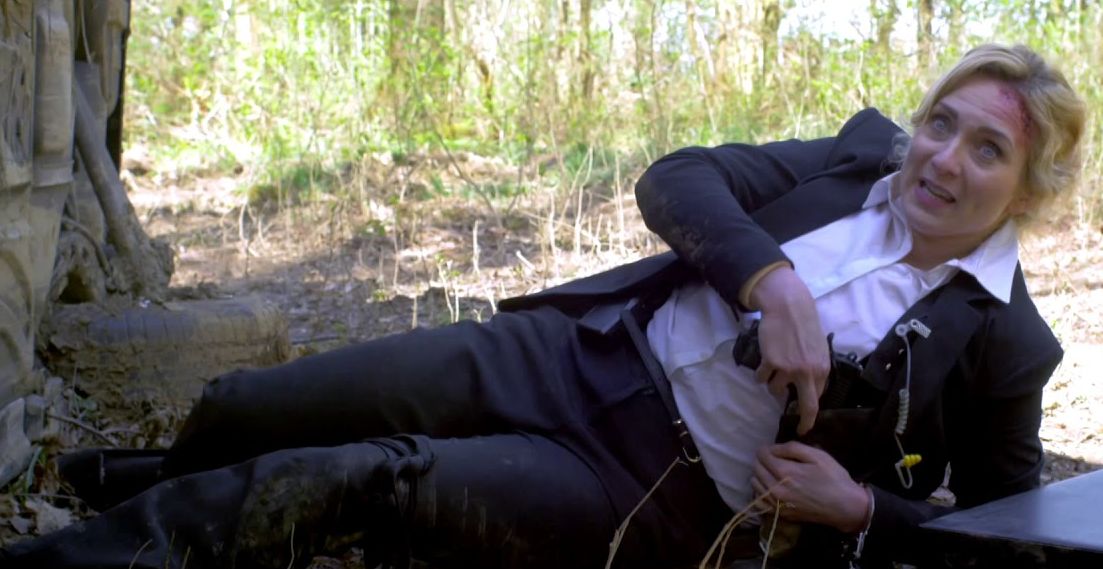
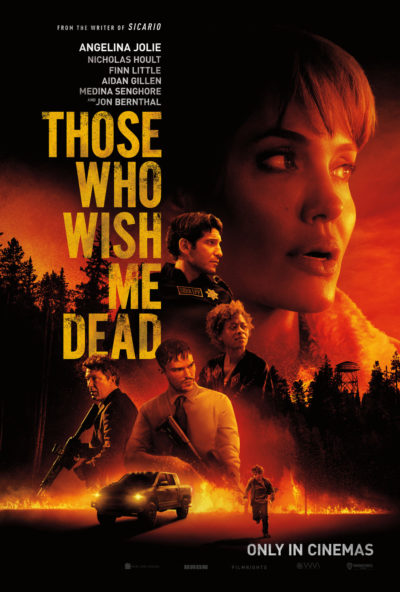
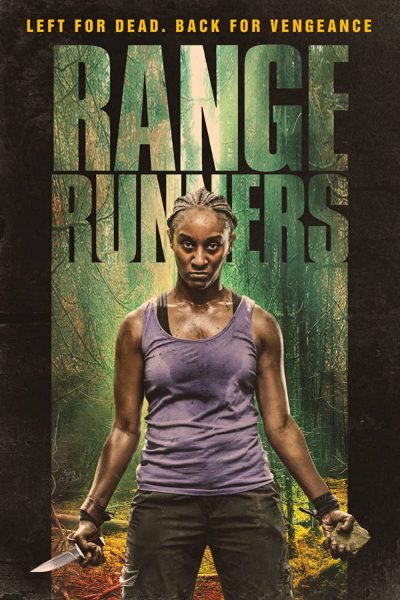 Mel (Cooper) is engaged on a project of running the Appalachian Trail (or a convincing facsimile thereof), with some help from her sister, who meets her at various points to provide support and fresh supplies. Mel is currently on her own, starting an eight-day section of the hike where she’ll be out of contact. However, she bumps into a couple of suspicious characters, deep in the woods: Wayland (Leonard) and his partner, Jared (Woods). Initially, it seems like a creepy, but one-off random meeting. It turns out to be considerably more and subsequent encounters escalate, until Mel is sent plummeting over the edge of a drop-off, badly injuring her leg, but in possession of something very important to Wayland and Jared. Will she be able to escape her pursuers and make it to safety?
Mel (Cooper) is engaged on a project of running the Appalachian Trail (or a convincing facsimile thereof), with some help from her sister, who meets her at various points to provide support and fresh supplies. Mel is currently on her own, starting an eight-day section of the hike where she’ll be out of contact. However, she bumps into a couple of suspicious characters, deep in the woods: Wayland (Leonard) and his partner, Jared (Woods). Initially, it seems like a creepy, but one-off random meeting. It turns out to be considerably more and subsequent encounters escalate, until Mel is sent plummeting over the edge of a drop-off, badly injuring her leg, but in possession of something very important to Wayland and Jared. Will she be able to escape her pursuers and make it to safety?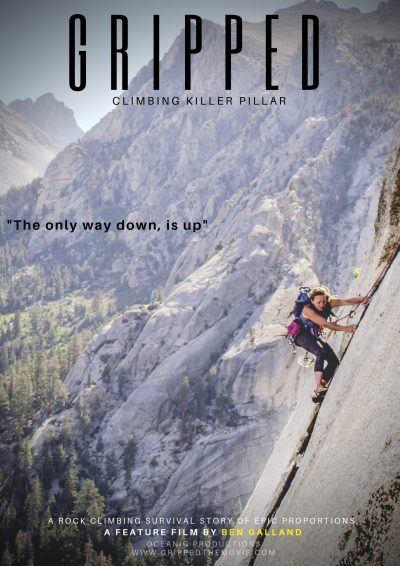 Newbie climber Rose (Maddox) is on her first trip to do some “real” climbing, rather than on a rock wall at her local gym. There, she meets and falls for the insanely rugged good-looking Bret (Lyman, who appears to have strayed right off the cover of a romance novel entitled “Love in the Surf”). After a couple of successfully, but relatively simple climbs, the pair head to take on something more challenging: the infamous “Killer pillar” of the title. Half-way up, a hand-hold used by Bret breaks, sending him tumbling down the cliff-face. Though the rope stops the fall from being fatal, he suffers a torn shoulder and head injury, leaving him unable to lead, and unable to descend. As the poster tagline says, “The only way down is up.” So, it falls on Rose, despite her lack of experience, to take over and forge a route up the near-sheer escarpment, that Bret will be able to navigate in her wake.
Newbie climber Rose (Maddox) is on her first trip to do some “real” climbing, rather than on a rock wall at her local gym. There, she meets and falls for the insanely rugged good-looking Bret (Lyman, who appears to have strayed right off the cover of a romance novel entitled “Love in the Surf”). After a couple of successfully, but relatively simple climbs, the pair head to take on something more challenging: the infamous “Killer pillar” of the title. Half-way up, a hand-hold used by Bret breaks, sending him tumbling down the cliff-face. Though the rope stops the fall from being fatal, he suffers a torn shoulder and head injury, leaving him unable to lead, and unable to descend. As the poster tagline says, “The only way down is up.” So, it falls on Rose, despite her lack of experience, to take over and forge a route up the near-sheer escarpment, that Bret will be able to navigate in her wake.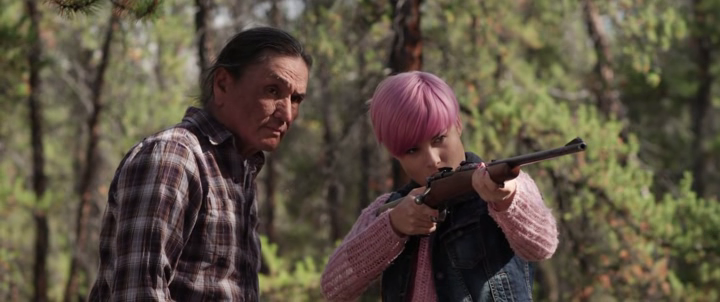 While certainly more relaxed that many of the films we cover here, this makes it in on the strength of its heroine’s character arc. That belongs to Lia (Jacobs), a teenage girl in the Northwest Territories of Canada, who is being raised by her father. When he has to go off for work, she gets sent north of the Arctic Circle to live with her grandmother (Jerome) for the nightless summer. She hates the rural life, and runs away, stealing a boat in the hope of reaching Dawson City, the nearest big town – not realizing it would be four weeks journey. She falls overboard after her boat breaks down, and is lucky to be rescued by Alfred (Howard), a hunter from the local Gwich’in tribe. As they cross the remote wilderness, she begins to appreciate it, bonding with the thoroughly down-to-earth Alfred and learning from him – wolves hate the smell of tobacco, apparently. But when an accident befalls her guide, Lia is going to have to dig into her own resources.
While certainly more relaxed that many of the films we cover here, this makes it in on the strength of its heroine’s character arc. That belongs to Lia (Jacobs), a teenage girl in the Northwest Territories of Canada, who is being raised by her father. When he has to go off for work, she gets sent north of the Arctic Circle to live with her grandmother (Jerome) for the nightless summer. She hates the rural life, and runs away, stealing a boat in the hope of reaching Dawson City, the nearest big town – not realizing it would be four weeks journey. She falls overboard after her boat breaks down, and is lucky to be rescued by Alfred (Howard), a hunter from the local Gwich’in tribe. As they cross the remote wilderness, she begins to appreciate it, bonding with the thoroughly down-to-earth Alfred and learning from him – wolves hate the smell of tobacco, apparently. But when an accident befalls her guide, Lia is going to have to dig into her own resources. This falls victim to the Spielberg Effect. By that, I mean, that any movie directed by Steven Spielberg will inevitably become the yardstick by which future entries of that kind are judged – typically, unfavourably. Killer shark films will be compared to Jaws. Holocaust epics to Schindler’s List. And the genre of movies in which drivers are menaced by unseen truck drivers? Expect comparisons to Duel. And in this case, they are entirely warranted. I guess if you’ve never heard of Duel, this might just pass muster. But you would still be better off watching it, than this lame imitation, which has a nice car (a Mustang) and some lovely scenery (I’m guessing Canadian). That’s all it can offer though.
This falls victim to the Spielberg Effect. By that, I mean, that any movie directed by Steven Spielberg will inevitably become the yardstick by which future entries of that kind are judged – typically, unfavourably. Killer shark films will be compared to Jaws. Holocaust epics to Schindler’s List. And the genre of movies in which drivers are menaced by unseen truck drivers? Expect comparisons to Duel. And in this case, they are entirely warranted. I guess if you’ve never heard of Duel, this might just pass muster. But you would still be better off watching it, than this lame imitation, which has a nice car (a Mustang) and some lovely scenery (I’m guessing Canadian). That’s all it can offer though.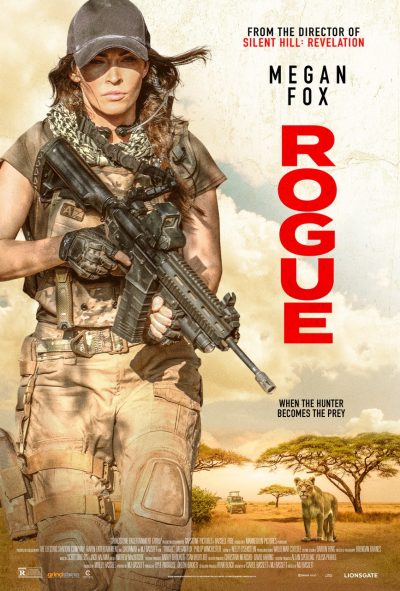 Megan Fox may not exactly be the first name which comes to mind when you think “battle-hardened mercenary leader.” But if you can get past your preconceptions, she’s definitely not the worst thing about this. We’ll get to what
Megan Fox may not exactly be the first name which comes to mind when you think “battle-hardened mercenary leader.” But if you can get past your preconceptions, she’s definitely not the worst thing about this. We’ll get to what 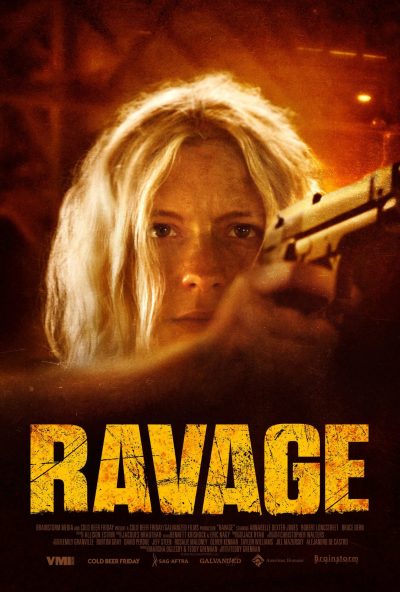 Wildlife photographer Harper Sykes (Dexter-Jones) is out in the wilderness of the “Watchatoomy Valley” [fictitious, but apparently located somewhere in the Virginias], when she stumbles across a group of men brutally attacking a victim. She snaps a few pics before fleeing the scene, but her attempts to report the incident to the authorities backfire immediately, and she quickly finds herself at the mercy of their leader, the appropriately-named Ravener (Longstreet). He explains the victim was a scout for big business, whose predations would destroy the natural environment, and so had to be stopped. Now, Harper is next in line. However, she is not the innocent and helpless victim they think. Even when she has the chance to escape, Harper decides to stay in the valley, and take vengeance on Ravener and the rest of his clan.
Wildlife photographer Harper Sykes (Dexter-Jones) is out in the wilderness of the “Watchatoomy Valley” [fictitious, but apparently located somewhere in the Virginias], when she stumbles across a group of men brutally attacking a victim. She snaps a few pics before fleeing the scene, but her attempts to report the incident to the authorities backfire immediately, and she quickly finds herself at the mercy of their leader, the appropriately-named Ravener (Longstreet). He explains the victim was a scout for big business, whose predations would destroy the natural environment, and so had to be stopped. Now, Harper is next in line. However, she is not the innocent and helpless victim they think. Even when she has the chance to escape, Harper decides to stay in the valley, and take vengeance on Ravener and the rest of his clan.